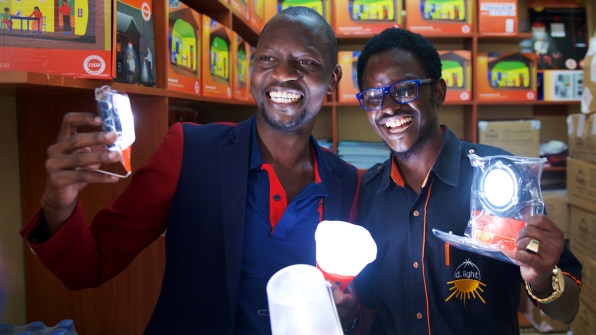When people living off-grid in sub-Saharan Africa need power or light, they often turn to diesel generators or kerosene-powered lamps. Not only are those energy sources expensive, dangerous, and often unreliable; they’re enormous sources of carbon emissions. Scale that to roughly 600 million suffering people in that region alone, and you’ve got an inefficient energy market that’s contributing heavily to climate change.
Acumen, a nonprofit that makes early investments in sustainable and socially minded business aimed at people in poverty, plans to fix both issues with KawiSafi Ventures, a $70 million off-grid energy fund through the management group Acumen Capital Partners. The goal is to speed up access to clean energy for low-income areas, according to a recent announcement. Over the next decade, that fund aims to empower at least 10 million people and offset at least 10 million tons of carbon dioxide.
“After a decade of investing more than $20 million of patient, philanthropic capital across the off-grid ecosystem, Acumen recognized the powerful potential of decentralized renewable energy solutions, both in terms of investment and impact,” says Amar Inamdar, managing director of KawiSafi Ventures in an email to Fast Company. “We were watching the energy landscape rapidly change and saw proven, profitable businesses emerge that were transforming how low-income people access electricity. These companies, however, need early-growth capital to scale so they meet customer demand and drive innovation.”

[Photo: courtesy Acumen]
Overall, Acumen estimates that consumers there still spend about $17 billon on non-efficient energy solutions annually. We saw the biggest opportunity in Africa, whose population is supposed to double by 2030, and created KawiSafi to accelerate the scale of these companies and prove that renewable, off-grid energy can be a faster, cheaper, and cleaner way to electrify the continent.
KawiSafi–which means “clean power” in Swahili–has been fundraising since 2016. So far, the early investments total $21 million, targeting ventures that can reach about 4 million people, according to Acumen. That’s separate from the initial multimillions that inspired these deals. As Bloomberg reports, investments can range from $750,000 to $10 million in different companies, and so far the fund has made five of them. KawiSafi includes money from other contributors like the Green Climate Fund, Skoll Foundation, and venture capitalists Steve Jurvetson and Chris Anderson.
The fund follows the same general formula of Acumen, which is making long-term investments with low return rates to encourage “patient” and sustainable growth. One of KawiSafi’s initial investments occurred in September 2016 when it joined a $22.5 million funding round for d.light, a solar lantern company that Acumen has also supported. (It’s most recent was OPES Solutions, an off-grid solar module company.)
Several years ago, d.light started out offering cheap, portable, and ultra-durable rechargeable lights (basic units cost about $5). It has since expanded to lights with panels that can also recharge electronics, and even a large grids for home power that allow the addition of multiple lights and appliances. In December 2018, d.light reportedly hit $41 million in funding.
That’s an example of the type of acceleration that KawiSafi hopes to encourage. “Acumen exists to solve the world’s toughest problems with solutions that start with the poor,” Inamdar says. “KawiSafi serves Acumen’s mission to change the way the world tackles poverty and addresses society’s greatest challenges to positively impact low-income communities around the globe.”
(21)